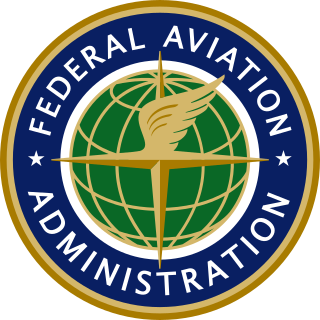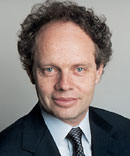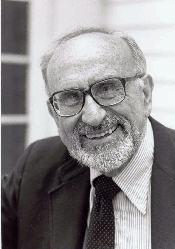
The Federal Aviation Administration (FAA) is a U.S. federal government agency within the U.S. Department of Transportation which regulates civil aviation in the United States and surrounding international waters. Its powers include air traffic control, certification of personnel and aircraft, setting standards for airports, and protection of U.S. assets during the launch or re-entry of commercial space vehicles, powers over neighboring international waters were delegated to the FAA by authority of the International Civil Aviation Organization.

The Airline Deregulation Act is a 1978 United States federal law that deregulated the airline industry in the United States, removing federal control over such areas as fares, routes, and market entry of new airlines. The act gradually phased out and disbanded the Civil Aeronautics Board (CAB), but the regulatory powers of the Federal Aviation Administration (FAA) were not diminished over all aspects of aviation safety.

Deregulation is the process of removing or reducing state regulations, typically in the economic sphere. It is the repeal of governmental regulation of the economy. It became common in advanced industrial economies in the 1970s and 1980s, as a result of new trends in economic thinking about the inefficiencies of government regulation, and the risk that regulatory agencies would be controlled by the regulated industry to its benefit, and thereby hurt consumers and the wider economy. Economic regulations were promoted during the Gilded Age, in which progressive reforms were claimed as necessary to limit externalities like corporate abuse, unsafe child labor, monopolization, pollution, and to mitigate boom and bust cycles. Around the late 1970s, such reforms were deemed burdensome on economic growth and many politicians espousing neoliberalism started promoting deregulation.

A regional airline is a general classification of airline which typically operates scheduled passenger air service, using regional aircraft, between communities lacking sufficient demand or infrastructure to attract mainline flights. In North America, most regional airlines are classified as "fee-for-departure" carriers, operating their revenue flights as codeshare services contracted by one or more major airline partners. A number of regional airlines, particularly during the 1960s and 1970s, were classified as commuter airlines in the Official Airline Guide (OAG).
Airline deregulation is the process of removing government-imposed entry and price restrictions on airlines affecting, in particular, the carriers permitted to serve specific routes. In the United States, the term usually applies to the Airline Deregulation Act of 1978. A new form of regulation has been developed to some extent to deal with problems such as the allocation of the limited number of slots available at airports.
The Air Commerce Act of 1926 created an Aeronautic Branch of the United States Department of Commerce. Its functions included testing and licensing of pilots, certification of aircraft and investigation of accidents.

The Civil Aeronautics Board (CAB) was an agency of the federal government of the United States, formed in 1938 and abolished in 1985, that regulated aviation services and conducted air accident investigations. The agency was headquartered in Washington, D.C.
Regulatory economics is the application of law by government or regulatory agencies for various economics-related purposes, including remedying market failure, protecting the environment and economic management.
Aviation law is the branch of law that concerns flight, air travel, and associated legal and business concerns. Some of its area of concern overlaps that of admiralty law and, in many cases, aviation law is considered a matter of international law due to the nature of air travel. However, the business aspects of airlines and their regulation also fall under aviation law. In the international realm, the International Civil Aviation Organization (ICAO) provides general rules and mediates international concerns to an extent regarding aviation law. The ICAO is a specialized agency of the United Nations.

Richard L. Revesz is an American lawyer and academic. He is the administrator of the Office of Information and Regulatory Affairs. During his government employment, he is on leave as the AnBryce Professor of Law at the New York University School of Law. He served as dean of the New York University School of Law from 2002 to 2013, and as the director of the American Law Institute from 2014 to 2023.
A public service company is a corporation or other non-governmental business entity which delivers public services - certain services considered essential to the public interest. The ranks of such companies include public utility companies like natural gas, pipeline, electricity, and water supply companies, sewer companies, telephone companies and telegraph companies. They also include public services such as transportation of passengers or property as a common carrier, such as airlines, railroads, trucking, bus, and taxicab companies.
Sharon Monica Oster was an American economist. She was the Frederic D. Wolfe Professor Emerita of Management and Entrepreneurship and the dean of Yale School of Management, where she was the first woman to receive tenure, and the first female dean. She was widely known as an economist focusing on business strategy and non-profit organization management.

Elizabeth Ellery Bailey was an American economist. She was the John C. Hower Professor of Business and Public Policy, at The Wharton School of the University of Pennsylvania. Bailey studied deregulation, market competition and regulatory capture through her career and contributed to the deregulation of the airline industry in the United States in the late 1970s.

Alfred Edward Kahn was an American economist and political advisor who specialized in regulation and deregulation. He was an important influence in the deregulation of the airline and energy industries. Commonly known as the "Father of Airline Deregulation," he chaired the Civil Aeronautics Board during the period when it ended its regulation of the airline industry, paving the way for low-cost airlines, from People Express to Southwest Airlines.

Trans Caribbean Airways (TCA) was an irregular air carrier until 1957, when it was certificated by the Civil Aeronautics Board (CAB) as an international air carrier to fly from New York City to San Juan, Puerto Rico. TCA thereafter operated as a small scheduled airline specializing in flying from New York to the Caribbean, adding a small number of additional routes over time until it was purchased by American Airlines in 1971.
In the United States, a legacy carrier is an airline that had established interstate routes before the beginning of the route liberalization permitted by the Airline Deregulation Act of 1978, and was therefore directly affected by it. Legacy carriers are distinct from low-cost carriers, which, in the United States, are generally new airlines that entered the market after 1978 to compete in the newly deregulated industry.
The Motor Carrier Regulatory Reform and Modernization Act, more commonly known as the Motor Carrier Act of 1980 (MCA) is a United States federal law which deregulated the trucking industry.
The L. Welch Pogue Award for Lifetime Achievement in Aviation was created by Aviation Week & Space Technology to be presented to an individual who is "considered a visionary and a preeminent leader of contemporary aviation."

Intrastate airlines in the United States were air carriers operating solely within a single US state and taking other steps to minimize participation in interstate commerce, thus enabling them to escape tight Federal economic airline regulation prior to US airline deregulation in 1979. These intrastate carriers therefore amounted to a small unregulated, or less regulated, sector within what was otherwise then a tightly regulated industry. Geography alone did not determine intrastate status.
Transportation in the United States is governed by laws and regulations of the federal government. The Department of Transportation is responsible for carrying out federal transportation policy, and the Department of Homeland Security is responsible for security in transportation.










